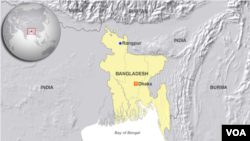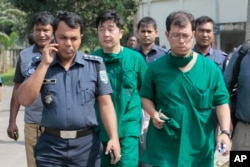The recent killings of an Italian and a Japanese citizen in Bangladesh have raised concern from foreign governments about the danger of violent attacks against their citizens abroad, and prompted a debate over whether the Islamic State or other violent radical Islamist groups are behind such attacks.
Three unidentified gunmen shot dead Italian Cesare Tavella, the local project manager of a Netherlands-based global development agency, in Dhaka’s diplomatic zone on September 28.
On Saturday, Kunio Hoshi, a Japanese citizen working on advanced farming techniques, was shot to death by three unidentified gunmen near his farm in Rangpur, 330 kilometers from Dhaka.
Such violent attacks on foreigners in Bangladesh are extremely rare, and the United States, the European Union and Japan have urged officials to quickly bring the perpetrators to justice.
Islamic State?
Twitter accounts associated with the Islamic State militant group posted statements taking credit for both killings.
The U.S.-based SITE Intelligence Group, which monitors online activities of radical Islamic groups, also reported that IS had claimed responsibility for both killings.
But Prime Minister Sheikh Hasina denied that Islamic State was responsible, instead blaming the country’s main opposition Bangladesh Nationalist Party (BNP) and its ally Jamaat-e-Islami for the two killings.
“BNP and Jamaat definitely abetted the two killings in their attempt to undermine Bangladesh’s all-positive achievements in recent years,” Hasina said.
BNP spokesperson Asaduzzaman Ripon flatly denied the claim, calling the prime minister’s accusation “unfair and unfortunate.”
Security analysts in Bangladesh are skeptical that Islamic State played a role in the killings of the two foreigners. They said that some “lone wolf” type Islamist radicals who support the jihadist ideology of a Middle Eastern group, might have been responsible.
"There may be a few lone wolves or very small splinter groups of local Islamists who are seeking endorsements of their subversive activities by the IS," Major General (Ret) Mohammad Abdur Rashid, executive director of Dhaka’s Institute of Conflict, Law & Development Studies, told VOA.
"Some among them might have carried out these two killings. You cannot say that these killings were the handiwork of IS just because the killers pledge allegiance to that group on their own. These groups, if they exist, are not directly linked to IS. We are pretty sure that IS does not have its network in Bangladesh,” he said.
No suspects
Several statements from Bangladesh police said that the motive behind the two killings, carried out in identical style following a gap of five days, appeared to have been engineered by the same group, driven by the same motive.
Bangladesh police have not been able to identify any suspects in the cases as yet and they say that investigators are searching for leads.
Bangladeshi authorities remain skeptical of online comments boasting that Islamic State was responsible.
Bangladesh’s home minister, Asaduzzaman Khan Kamal, told local media that such comments online are “rubbish.”
“Neither the group is present in the country nor did it carry out any of the two killings. Some with vested interest to create instability in the country organized these two killings.”
U.S. Ambassador to Bangladesh Marcia Bernicat said the United States and Bangladesh would be together in a “joint effort” to fight terrorism in the country.
“The U.S. government has taken seriously the claims of responsibility by the IS, and we are working hard right now with your government to verify whether or not those claims are accurate... I urge the government of Bangladesh to investigate every aspect of this crime and to bring the perpetrators to justice as soon as possible”, Bernicat said in a news conference on Sunday.
Bangladesh’s foreign minister and other senior officials met the foreign diplomats in Dhaka on Tuesday and assured them that the security agencies have stepped up their cover in areas where there are foreign nationals.
“We have heightened the security measures at the workplaces and homes of all foreign diplomats. We have also provided adequate security to other foreign citizens living and working across the country,” Bangladesh Foreign Minister AH Mahmood Ali said.
Impact on economy
Embassies and high commissions of several Western countries, Japan and South Korea, have issued warnings for diplomats and citizens to be careful about their personal security.
A trade body in Bangladesh warned that the killing of the two foreigners could tarnish the country’s image and negatively impact Bangladesh’s export and foreign investment.
“We are imploring the government to take immediate steps to ensure the security of foreigners which is believed to boost confidence for increased FDI [foreign direct investment] in Bangladesh,” the Dhaka Chamber of Commerce and Industry said in a statement.
Garment exporters said the attacks may pose a threat to Bangladesh’s $25.5 billion garment industry, the lifeblood of the country’s economy. Several garment exporters said that they fear losing Western buyers who often visit Bangladesh for the deals.
"One garment exporter in our locality said that one of his buyers from the U.S. who was set to visit his factory next week has cancelled his Bangladesh tour," Masood Alom, a garment factory floor manager in Narayanganj, told VOA. "I know of another cancellation of a trip to Bangladesh by another European buyer who was set to visit a factory in Narayanganj. We fear losing at least some of our buyers based in other countries,” he said.
Tour operators in Bangladesh say that the two killings have scared many foreign tourists.
“From Europe, Korea, Japan and other countries, at least 200 tourists who were to visit Sundarbans and other places this month under the arrangement of my company, have cancelled their trips to Bangladesh in the past few days. It’s clear that the killings of the two foreigners have forced them to avoid Bangladesh,” Masud Hossain of Bengal Tours in Dhaka said to VOA.
“I am sure many other tour operators are experiencing identical situation.” Masud Hossain said.
Mozaffar Hossain, a tour operator in Kolkata, said today that in the past three days at least 100 tourists from Europe, Korea, Japan and Australia who were to fly to Dhaka from Kolkata with support from his agency, have cancelled their tickets.






